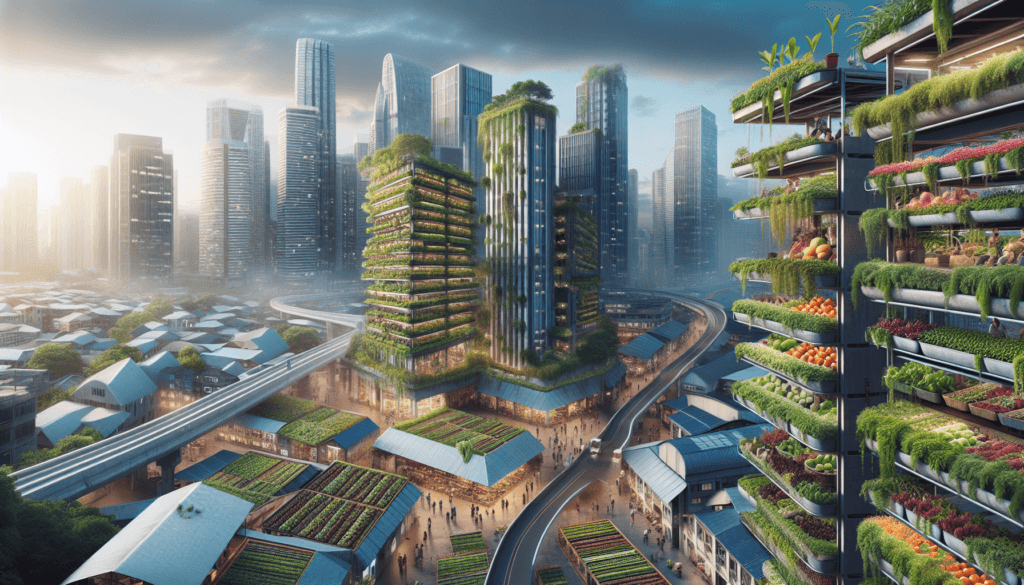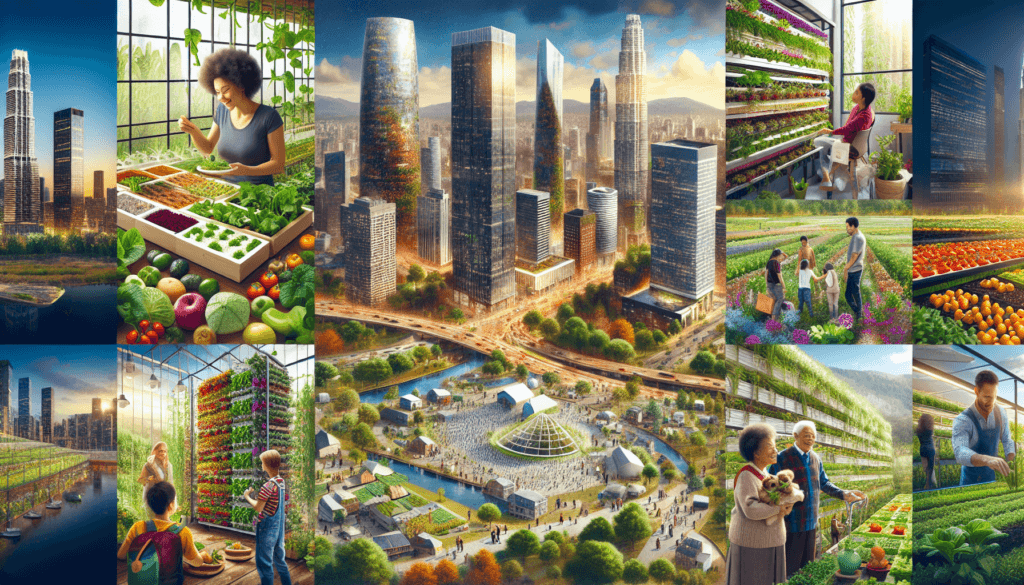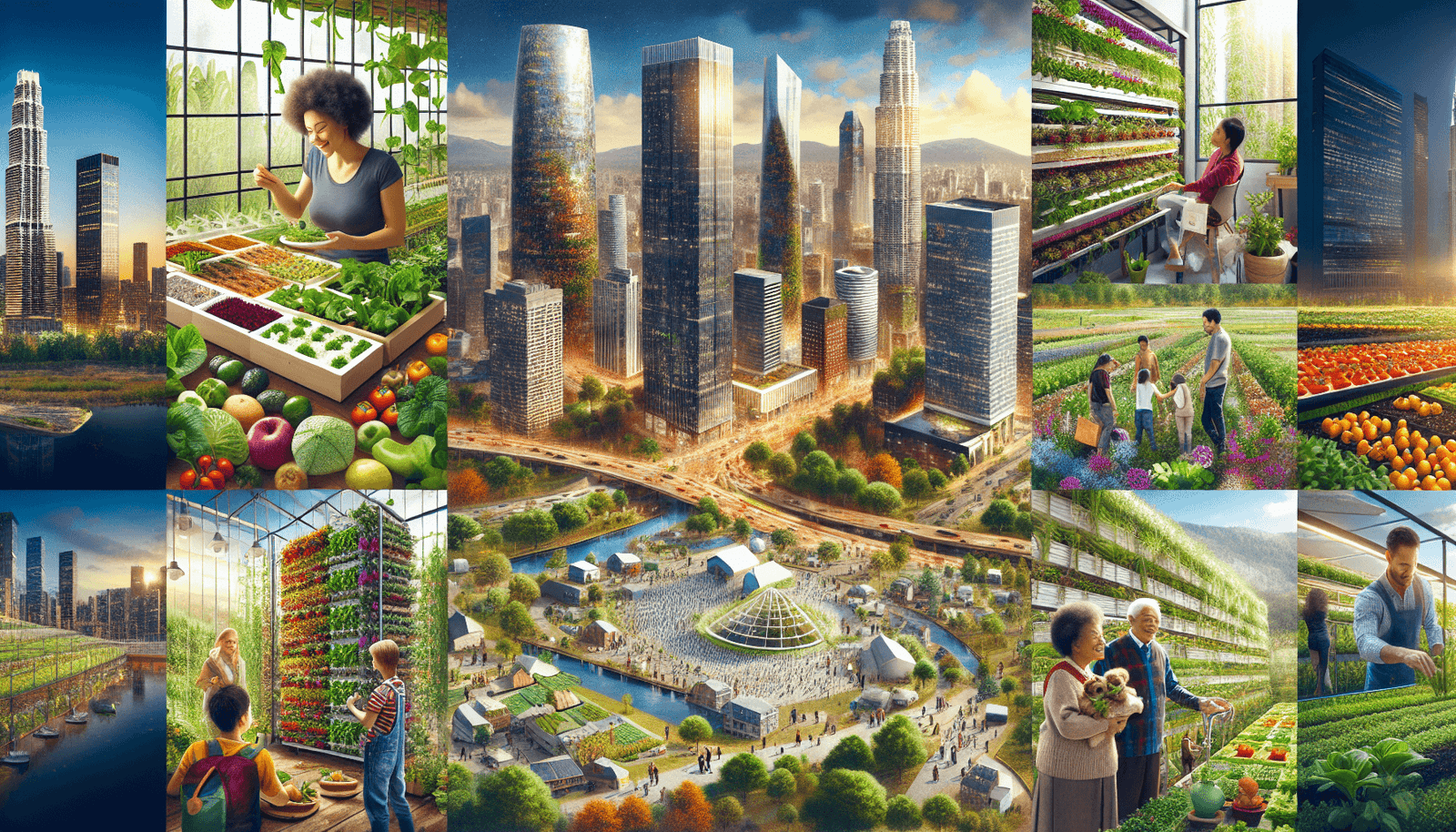Imagine a world where your favorite fruits and vegetables are not only grown in rural areas, but also right in your own city. Urban farming has become a growing trend in recent years, as more and more people are realizing the numerous benefits it brings to urban environments. From improving access to fresh and nutritious food, to promoting community engagement and sustainable practices, urban farming is transforming the way we think about and interact with our cities. In this article, we will explore some of the key urban benefits of farming in the city, and how it is reshaping our urban landscapes for the better.

Improved Food Security
Access to fresh and nutritious food
Urban farming brings numerous benefits to city dwellers, with improved food security being one of the significant advantages. By cultivating crops and raising livestock within the city, individuals gain easier access to fresh and nutritious food. Instead of relying solely on grocery stores or farmer’s markets, urban farming empowers you to grow a variety of fruits, vegetables, and herbs right in your own backyard or community garden. This direct access to wholesome produce ensures that you and your community always have access to healthy food options.
Reduction in food deserts
One of the critical challenges faced by many urban areas is the presence of food deserts, where access to affordable fresh food is limited, often due to socioeconomic factors. Urban farming helps address this issue by bringing food production closer to communities. By growing food in vacant lots, rooftops, or indoor spaces, urban farmers provide a much-needed solution to these underserved areas. The availability of locally-grown produce not only helps combat food deserts but also allows residents to have a wider range of affordable and healthy food choices.
Decreased reliance on long-distance transportation
Traditional farming practices often entail long-distance transportation to bring food from rural areas to urban centers. This transportation process not only increases the carbon footprint but also diminishes the freshness and nutritional value of the produce. However, with urban farming, there is a significant reduction in the need for long-distance transportation. By cultivating food in the heart of the city, the time and energy required to move food from farm to table are significantly reduced. This results in fresher and more nutritious food reaching consumers, contributing to improved overall health and well-being.
Diversification of food sources
Urban farming encourages the diversification of food sources by introducing a wider variety of crops and livestock into the urban landscape. While traditional farming tends to focus on large-scale monoculture, urban farming allows for the cultivation of a diverse range of fruits, vegetables, and herbs. With this diversification, you can broaden your palate, explore new flavors, and experience a greater nutritional variety in your daily diet. Additionally, the cultivation of diverse crops helps strengthen the resilience of the food system, making it less vulnerable to pest outbreaks or climate-related challenges.
Environmental Sustainability
Reduced carbon footprint
By embracing urban farming, you actively participate in reducing the carbon footprint of the food system. The long-distance transportation required to bring food from rural farms to cities contributes significantly to greenhouse gas emissions. However, when food is grown locally within city limits, transportation distances are minimized, resulting in a substantial reduction in carbon emissions. This, in turn, helps mitigate climate change and promotes a more sustainable future for our planet.
Preservation of green spaces
Traditional urban landscapes often lack green spaces due to the dense nature of cities. However, with urban farming, parts of unused land or rooftops are transformed into vibrant gardens. This not only beautifies the cityscape but also preserves and enhances green spaces. These urban gardens provide a sanctuary for plants, birds, insects, and other wildlife, creating small ecosystems amidst the concrete. By incorporating green spaces into the city fabric, urban farming contributes to the overall ecological balance and improves the quality of life for both people and nature.
Water conservation
Water is a precious resource, and urban farming practices often place a strong emphasis on water conservation. Through innovative techniques like drip irrigation, rainwater harvesting, and the use of hydroponics or aquaponics systems, urban farmers minimize water wastage while ensuring the optimal hydration of their plants. This commitment to water conservation is crucial, especially in urban areas where water scarcity can be a pressing issue. By utilizing water-efficient methods, urban farming helps preserve and protect this vital resource for future generations.
Efficient land use
With urban land at a premium, efficient land use is of utmost importance. Urban farming maximizes the use of available space by utilizing rooftops, balconies, community gardens, and vertical farming techniques. By making the most of these underutilized areas, urban farmers are able to produce a significant amount of food within a limited footprint, making efficient use of the urban landscape. This efficient land use not only supports the local food system but also encourages more sustainable urban development by reducing the need for urban expansion into natural or agricultural areas.

Economic Opportunities
Job creation
Urban farming presents numerous job opportunities within the community. From cultivation and maintenance to distribution and sales, various roles are created to support the local food production system. Urban farms require a workforce to tend to the crops, manage the livestock, operate equipment, and handle marketing and sales. These job opportunities not only benefit individuals by providing income and stability but also contribute to the overall economic growth and vitality of the community.
Local economic development
Through urban farming, cities can stimulate local economic development. By supporting and promoting local produce, urban farming fosters a thriving market for locally-grown food. This, in turn, helps to strengthen local businesses and create economic opportunities within the community. Farmers’ markets, farm-to-table restaurants, and other food-related businesses can flourish and attract visitors, contributing to increased tourism and revenue generation. By invigorating the local economy, urban farming enhances the overall prosperity and self-sufficiency of the urban community.
Entrepreneurial opportunities
Urban farming also provides a platform for entrepreneurial endeavors. Individuals with a passion for sustainable agriculture can start their own urban farms or establish innovative businesses around urban food production. From vertical farming startups to companies specializing in urban gardening equipment, entrepreneurship in the field of urban farming is on the rise. These ventures not only contribute to local economic growth but also foster creativity and innovation in addressing urban challenges. The entrepreneurial opportunities presented by urban farming allow individuals to pursue their passions while making a positive impact on society.
Improved Community Health
Increased physical activity
Urban farming promotes increased physical activity among community members. Engaging in gardening and farming activities requires individuals to be physically active, whether it involves preparing soil, planting seeds, weeding, or harvesting crops. The physical exertion involved in these activities provides an opportunity for exercise and can improve overall fitness levels. By encouraging a more active lifestyle, urban farming helps combat sedentary behavior and its associated health risks, contributing to the overall well-being of the community.
Accessible therapy and stress reduction
Engaging in urban farming can serve as a therapeutic activity, offering stress reduction and mental relaxation. The act of tending to plants, nurturing them, and witnessing the fruits of your labor provides a sense of fulfillment and satisfaction. The opportunity to connect with nature and engage in a calming activity helps alleviate stress and promotes mental well-being. Additionally, community gardens and urban farming initiatives often create spaces for social interaction, allowing like-minded individuals to share experiences, support one another, and build a sense of community.
Enhanced mental well-being
Urban farming is known to have positive effects on mental health. Studies have shown that spending time outdoors, especially in green spaces, can reduce symptoms of stress, anxiety, and depression. Urban farming provides city dwellers with the opportunity to reconnect with nature, even within the confines of a bustling city. The therapeutic benefits of urban gardening, such as being immersed in natural surroundings and engaging in a mindful activity, can contribute to improved mental well-being and overall quality of life for individuals and communities.
Reduction in air pollution
By incorporating green spaces and promoting vegetation, urban farming contributes to the reduction of air pollution in cities. Plants play a crucial role in removing pollutants from the air through processes like photosynthesis. The presence of urban farms and community gardens increases the total green cover in urban areas, helping to filter pollutants and improve air quality. By reducing air pollution, urban farming helps mitigate respiratory issues and improves the respiratory health of residents, creating a healthier urban environment for all.

Social Cohesion
Community engagement
Urban farming serves as a catalyst for community engagement and interaction. Whether it’s through community gardens, volunteer opportunities, or shared gardening spaces, urban farming brings people together. Individuals from diverse backgrounds can come together to cultivate and harvest food, fostering a sense of belonging and connection. Community engagement through urban farming strengthens social ties, promotes cooperation, and builds a sense of camaraderie among residents. By creating shared spaces and activities, urban farming enriches the social fabric of the community and enhances social cohesion.
Inter-generational bonding
Urban farming provides an avenue for inter-generational bonding and learning. Children, adults, and the elderly can collaborate in the process of farming, sharing knowledge, skills, and experiences. Grandparents can pass down traditional farming practices to younger generations, while the youth can introduce innovative techniques and technologies. This inter-generational exchange not only promotes mutual understanding but also strengthens family and community ties. By bridging the generation gap and fostering a sense of unity, urban farming brings people of all ages together in pursuit of a common goal.
Support for vulnerable populations
Urban farming has the potential to address social inequalities and support vulnerable populations within cities. Community gardens and urban farms can act as a source of fresh and affordable produce for low-income individuals and families. These initiatives often collaborate with local food banks or community organizations to ensure that healthy food is accessible to those in need. By providing support and resources, urban farming empowers vulnerable populations, promotes food justice, and helps combat food insecurity. This support system strengthens the social fabric of the community and ensures that no one is left behind.
Educational Opportunities
Hands-on learning experiences
Urban farming provides hands-on learning experiences for individuals of all ages. Schools, community centers, and educational institutions can incorporate urban farming into their curriculum to teach students about sustainable agriculture, biology, and environmental science. Through active participation in growing and tending to plants, students can gain practical knowledge and develop important skills such as problem-solving, teamwork, and critical thinking. These hands-on learning experiences offer a holistic approach to education and promote a deeper understanding of the natural world.
Environmental education
Urban farming serves as a platform for environmental education in urban areas. By engaging in the process of growing food, individuals gain a better understanding of the importance of sustainable practices, soil health, water management, and biodiversity conservation. Urban farms can host workshops and educational programs that highlight the interconnectedness between food production and environmental sustainability. This environmental education fosters a sense of environmental stewardship and empowers individuals to make more informed choices that contribute to a greener and more sustainable urban environment.
Practical life skills
Engaging in urban farming cultivates practical life skills that are applicable beyond the realm of agriculture. From planning and organization to problem-solving and time management, individuals involved in urban farming develop a range of skills that can be transferred to various aspects of their lives. These practical life skills, such as nurturing living organisms, understanding the importance of patience, and adapting to changing circumstances, enhance personal growth and resilience. The lessons learned through urban farming empower individuals to become self-sufficient, environmentally conscious, and adaptable members of their communities.

Urban Microclimates
Temperature regulation
Urban areas often experience higher temperatures due to the heat island effect, where concrete and asphalt absorb and radiate heat. Urban farming can help regulate temperatures by creating green spaces with vegetation that provide shade and cooling effects. The presence of trees, plants, and green roofs helps reduce the temperature in urban microclimates, making cities more comfortable and liveable. By mitigating the heat island effect, urban farming supports the creation of a more sustainable urban environment and reduces the energy consumption required for cooling buildings.
Reduced heat island effect
The heat island effect refers to the urban phenomenon where temperatures are significantly higher in cities compared to surrounding rural areas. By incorporating urban farming initiatives, cities can counteract this heat island effect. Plants release moisture through a process called transpiration, which cools the surrounding air. The presence of urban farms and green spaces increases transpiration, leading to a reduction in local temperatures. This cooling effect not only improves the comfort of residents but also mitigates the strain on energy resources from excessive air conditioning usage.
Improved air quality
Urban farming plays a vital role in improving air quality in cities. Plants absorb carbon dioxide during photosynthesis and release oxygen, helping to purify the air. By increasing green spaces and implementing urban farming projects, cities can significantly enhance air quality. The plants and vegetation in urban farms act as natural air filters, removing pollutants and particulate matter from the atmosphere. Improved air quality contributes to a healthier environment and reduces the risk of respiratory illnesses for urban residents.
Biodiversity and Wildlife Habitat
Preservation of native plant species
Urban farming can contribute to the preservation of native plant species. By incorporating native plants into urban gardens and farms, cities create habitats that support local biodiversity. Native plants are adapted to the local climate and are crucial for the survival of many species of insects, birds, and other wildlife. By preserving native plants, urban farming helps maintain the delicate balance of local ecosystems, promoting biodiversity and protecting native species from extinction. This preservation of native plant species contributes to the overall ecological health and resilience of urban areas.
Creation of urban green corridors
Urban farming initiatives can help create green corridors within cities, connecting existing green spaces and promoting biodiversity. These green corridors serve as pathways for wildlife, allowing them to navigate the urban landscape and access essential resources such as food, water, and shelter. By establishing and maintaining these corridors, urban farms provide valuable habitats and stepping stones for wildlife, creating a more interconnected urban ecosystem. The creation of urban green corridors through urban farming contributes to the conservation of wildlife habitats and fosters a sense of harmony between humans and nature within the city.
Support for pollinators and beneficial insects
Urban farming provides a sanctuary for pollinators and beneficial insects, which play a vital role in maintaining healthy ecosystems. Many urban agricultural practices prioritize organic and pesticide-free methods, creating a safe haven for pollinators like bees and butterflies. By providing nectar-rich flowers and a diversity of plant species, urban farms attract and support these essential contributors to food production and biodiversity. The presence of pollinators and beneficial insects in urban farming spaces not only ensures the successful pollination of crops but also helps to sustain and cultivate urban biodiversity as a whole.

Waste Reduction and Recycling
Composting and organic waste management
Urban farming promotes composting and organic waste management practices, reducing the amount of waste that ends up in landfills. Food waste and organic matter can be transformed into nutrient-rich compost through proper composting techniques. This compost can then be used as a natural fertilizer for urban farms and gardens, closing the loop and minimizing the need for synthetic fertilizers. By actively participating in composting and organic waste management, urban farmers contribute to the reduction of waste and the creation of a more sustainable and circular food system.
Utilization of food scraps
Urban farming encourages the utilization of food scraps as a valuable resource. Rather than discarding food scraps, they can be repurposed and used to nourish plants and enhance soil health. By composting food scraps or utilizing techniques like vermicomposting (using worms to break down organic matter), urban farmers can extract nutrients from these scraps and incorporate them back into the food production cycle. This utilization of food scraps not only reduces waste but also reduces the need for synthetic fertilizers and promotes a more sustainable approach to urban farming.
Reduction in packaging waste
By growing food within the city, urban farmers reduce the reliance on pre-packaged produce and contribute to the reduction of packaging waste. The conventional food system often relies on excessive packaging, which generates significant amounts of waste that ends up in landfills or pollutes the environment. However, with urban farming, individuals have the opportunity to produce their own food or source it directly from local farmers. This direct access to fresh produce eliminates the need for excessive packaging, supporting a more environmentally-friendly approach and reducing the overall waste generated by the food system.
Food Education and Awareness
Promotion of healthy eating habits
Urban farming plays a vital role in promoting healthy eating habits within urban communities. By cultivating fresh and nutritious produce, urban farmers inspire individuals to prioritize healthy food choices. Through farmers’ markets, community-supported agriculture programs, or direct sales from urban farms, individuals have the opportunity to access locally-grown, wholesome food. The direct connection between people and their food source fosters an understanding of the importance of a balanced diet and encourages the consumption of a variety of fruits and vegetables, leading to improved overall health and well-being.
Understanding of food production processes
Engaging in urban farming provides individuals with a deeper understanding of food production processes. By actively participating in planting, nurturing, and harvesting crops, urban farmers gain insight into the challenges and complexities of food production. This experiential learning allows individuals to appreciate the effort and resources required to produce the food they consume. Understanding the intricacies of food production processes fosters a sense of appreciation and respect for our food system, encouraging more mindful consumption and promoting sustainable practices within the urban community.
Reduction in food waste
Urban farming endeavors can contribute to the reduction of food waste. Often, produce that doesn’t meet aesthetic standards or has minor imperfections is discarded by the conventional food system. However, in urban farming, such produce can still be utilized and valued. By incorporating “ugly” or imperfect produce into their meals, individuals practicing urban farming reduce food waste and help combat the global issue of food loss. This reduction in food waste not only benefits the environment but also supports a more sustainable and ethical approach to food consumption.


